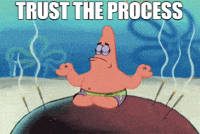Personal Blueprint for a Tech Team
- 6 minsThree years ago, I felt the need for a “reset” because I was frustrated that the profession I once glorified had become the one I dreaded. It’s strange to even say that, but it’s true.
So, I started searching for opportunities overseas, hoping to migrate and start fresh, thinking maybe, just maybe, this would reignite my passion for software development.
But, of course, life had other plans. I stumbled upon a job ad for something in wealth bla-bla—my inner peasant got curious, HAHA—so despite the lack of life reset package, I decided to push my luck. Fortunately, I got hired and started working at Avaloq in August 2021.
And that’s where I met these amazing people.
 Shoutout to Denisa, Marc and Simon—couldn’t make it to the team photo, but they’re very much part of the squad and totally awesome too!
Shoutout to Denisa, Marc and Simon—couldn’t make it to the team photo, but they’re very much part of the squad and totally awesome too!
In this post, I’m gonna zero in on what I believe are the essential qualities beyond technical expertise that make a tech team stellar, based on insights I’ve gained from the diverse and amazing peers I’ve had the chance to work alongside.
Humor and Fun
This is a no-brainer, but I’ll say it anyway: A culture that allows people to be tickled by memes is a culture that thrives.

The tech industry is a factory of challenges and a shit-ton of frustrations, so sharing a good laugh during your daily standup, retro, or even poking fun at the code that’s about to get rejected is nice for keeping morale up. Being on a highly technical team at Avaloq, it’s a relief to work with peers who can joke around and appreciate humor—because, let’s face it, work stress is no joke.
But of course, there’s a time and place for everything. Still, as much as possible, try to embrace life’s little joys—they’re non-taxable and free.
And hey, don’t tell the politicians! 😉
Shared Values
I once heard on one of the episodes of the HustleShare podcast that in life there are five important things: Family/Relationships, Health, Work/Career, Friends, and Spirituality—but you can only prioritize three at a given time. My top three back then were:
- Work/Career
- Family/Relationship
- Health
Work always came first because, that’s where the money was. It gave me the lifestyle I wanted without relying on anyone. Burnout? I didn’t care—after all, I was young and figured I’d have time and resources to bounce back later. Fuck. What an imbecile, right?
Those priorities stuck until about three years ago when my mind and body hit their limit. I was so fucking tired and needed a reset. So when I joined Avaloq, my plan was simple: stay for a year, ride out the pandemic, and then try my luck again with migrating overseas.
But as time went on, the people I met here changed my perspective—peers who shared the values I realized were important to me.
-
Work-Life Balance: I found that the team here believes in not overloading themselves with work. It’s clear that everyone understands you can only do so much in a day. Slow Down: While speed is king sometimes (Marketing Peepz! Yo!), the team emphasizes quality over rushing. They take the time needed to do things right.-
Hobbies/Interest: Beyond just balancing work and rest, the team embraces life outside of work. Whether it’s dancing, biking, or building LEGO sets with their kids, everyone makes time for what they love. Hearing about this balance firsthand even inspired me to take up jogging as part of my routine too (don’t wanna be left out HAHA!).So yeah, I guess being passionate about your work doesn’t mean sacrificing the things that make life enjoyable.
So if I will revisit the five important things in life, my top three now are:
- Health
- Family/Relationships
- Work/Career (I’m sorry friends and spirituality 🙈)
And this is why I believe that when a team shares the same values, it leads to a more positive environment, better collaboration, and sustained growth in both career and personal life.
Ways of Working
I’ve always disliked development processes that are too rigid, with too many meetings and ceremonies—some of which can feel like a waste of human intellect if I’m being honest.

At work, we follow Agile practices to save humanity. Thankfully, our scrum master knows how to balance the Agile framework with what the team actually needs, rather than sticking strictly to the Agile manifesto.
-
No Planning Poker: Amen to this! I’ve had my fair share of sessions in the past where we spent hours debating the complexity of a task. In my current team, JIRA tickets simply come with at least a decent description and acceptance criteria—enough to get us started. If more details are needed, anyone can post a question in our Teams channel or bring it up in a brainstorming session.
I personally prefer this approach because it gives developers the space to think independently and gather their thoughts, rather than being stuck in a meeting room for hours with just a few minutes to assess the complexity of a task. Everyone processes information differently, and this method allows each person to think at their own pace.
-
Retro with a Twist: Instead of sticking to the traditional “What went well, what didn’t” format, we start with “warm-up” questions to set the mood. Questions like “What’s your go-to vacation spot?” give the team a chance to share a bit of their personal lives and get to know each other better. In my simple mind this breaks the notion that retrospectives are just about finding and fixing flaws.
I’m no Agile buff by any means, but I believe the essence of retrospectives is to improve the future and strengthen team dynamics.
-
Daily Standup: Here’s a nugget of wisdom: I believe having a scrum master with a development background or technical knowledge makes a huge difference. It’s easier to connect and share updates because they can relate to the technical challenges and nuances we face. Plus, they’re able to offer relevant guidance and support through insightful questions and suggestions.
This isn’t to throw shade at scrum masters without a tech background, but as a developer, I’ll take a scrum master with technical know-how any day over one who’s fixated on numbers, charts, and deadlines.
While writing this post, I kinda remembered some pantry interactions with my first boss in the tech industry. At that time, there was a bit of a resignation trend in the group, and he said this:
We need to give people a reason to stay. And for those who choose to leave, a reason to come back.
Back then, my inner peasant thought, “Screw that! We’re just here for the cash—throw in some extra coins, and we’re good! 🤑”
But with hindsight being 20/20, I’ve come to see things differently now.
Thank you for reading!
P.S. I want to give a special shoutout to my peers who have moved on to other opportunities. Man, I can’t thank you guys enough for the things I’ve learned from you. Wherever your paths take you next, I hope it’s somewhere you’re happy to be. 🍻

